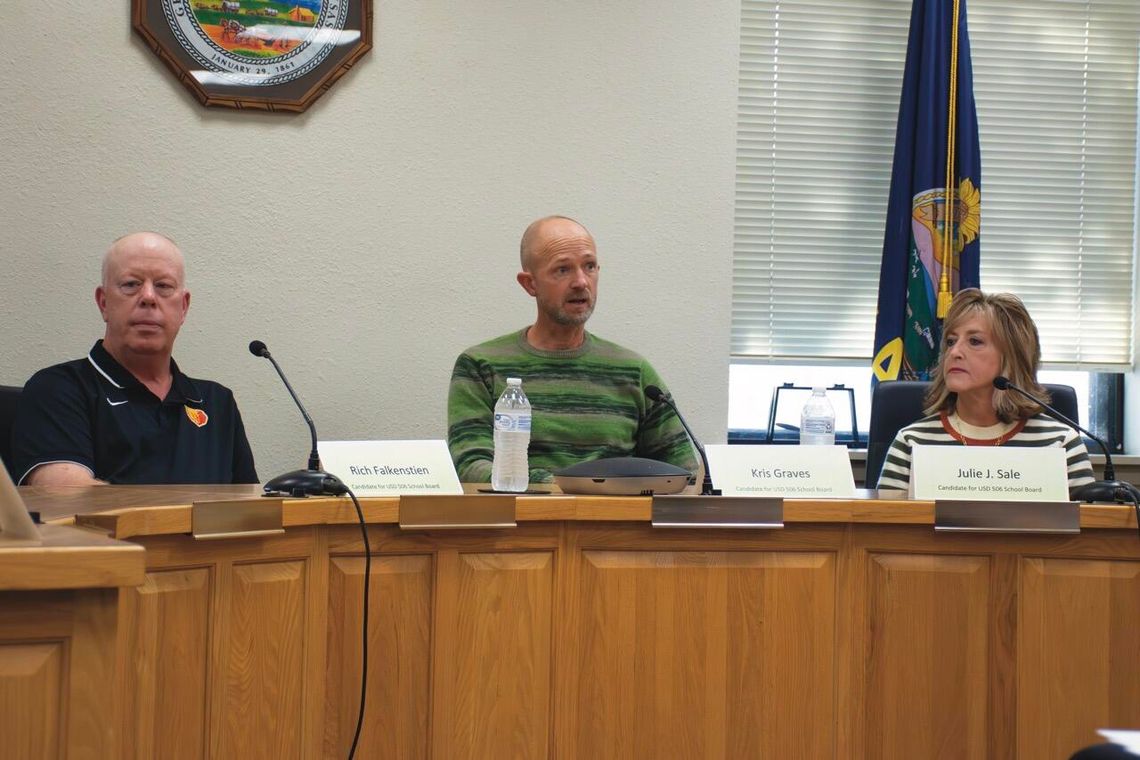Last week, the Parsons Chamber of Commerce hosted a candidate forum ahead of Election Day, moderated by Economic Development Director Jim Zaleski.
Attendees and viewers heard from several candidates running in local races, including the USD 506 Board of Education race.
Three district seats are up for election this year. In District 2, position 5, Julie Sale and Jyssica Lahey are running. For District 3, Position 6, incumbent Rich Falkenstien is running against challenger Kris Graves. Jessica Rush is running unopposed for the District 1, Position 4 seat. Lahey and Rush were not present during the forum.
After an introductory statement, Aj Kohler of KLKC radio began presenting questions.
The first question Kohler asked was: How are changes in support of education at the federal level impacting local school boards?
“Not being on the school board yet, I can’t answer that question in depth. I know that there is a lot of changes happening very fast with the Department of Education,” Graves said. “I believe all that really means is it makes the school board’s role that much more important — the oversight that it provides, the leadership, and the policy-setting.
Graves also said that the board may have to be more proactive with less guidance coming from the federal government.
Sale answered next, noting that she was also not a current member of the school board and did not know the intricate details.
“I feel like the federal funding is going to be less and be pushed down to the state, which will change things a lot,” Sale said. She noted that her background was in accounting and finance, and said she was very interested in learning more about the topic.
Falkenstien said the biggest issue is the lack of funding for special education.
“That's put a real burden on the school district to come up with the funds to provide for the special needs kids,” Falkenstien said.
He said he brought a “learning to live with what we have” attitude to the board.
“One of the things I am most proud of with our administration and our staff is their ability to create over $12 million in grant funding to provide our with some needs that we couldn’t do otherwise.”
The second question was: With new technologies such as AI becoming more prevalent and more accessible for everyday use, what role do you think this kind of technology should have in the learning process?
All candidates agreed that students must learn how to think and create for themselves, and they must learn how to utilize AI as a tool, which they may need to use as a member of the workforce.
The next question was: What do you think should be the two or three highest priorities in the school district?
“It’s probably different for each school district,” Falkenstien said. However, he said funding and the allocation of that funding is always going to be an issue. He also noted that many members of the administration within the district are nearing retirement.
“Being able to find people to replace those folks is going to be a difficult challenge, one which is going to take a lot of work and a lot of dedication to fill those shoes,” Falkenstien said.
Graves said his priorities are also recruitment and retention, along with ensuring students have opportunities compared to other schools in the area.
Sale said financing is what comes to her mind, along with staying on top of technology changes, and transportation.
Candidates then discussed how to attract and retain qualified educators.
Graves said a good wage would attract candidates, as would a healthy and supportive culture.
“I think that we are fortunate that we do have that,” Graves said.
Sale said wages and benefits have to be competitive, and educators need to feel supported and appreciated.
Falkenstien said recruiting is a main goal of the board, and that those recruitment efforts are supported by offering competitive wages and benefits.
“That's probably one of the greatest jobs as a school board member is just to be supportive, to be — for lack of a better word — a cheerleader for our staff and our people,” Falkenstien said.
Candidates were asked if they were satisfied with the district’s facilities, and all candidates said they were happy with the facilities, and said they were well-maintained. Falkenstien noted that grants were largely responsible for providing funding to maintain the district’s assets.
The last question asked was: What can be done to improve student achievement and ensure everyone who graduates is college-ready or ready to enter the workforce?
Falkenstien said that the standards should be set high, and that schools should expect greatness from their students.
“I’m a firm believer that young people will rise up to the expectations you set for them,” Falkenstein said. He also said that providing support for teachers can make a positive impact.
Graves said that it was important for students to have a wide variety of offerings for students to find what interests them.
“Something is going to light a spark for every kid,” Graves said.
Sale said that working with students on an individual level to make improvements, as well as expanding technical education, can improve student success.
Here is a brief breakdown of the other races: Parsons City Commission (three seats): Incumbents Verlyn Bolinger, Leland Crooks and Eric Strait and challenger Ryan Robertson.
USD 503 Board of Education (three seats): Incumbents Julie Legler and Jeffrey Quirin, and challengers Dennis Dodd and Mike Hentzen.
Two candidates filed for re-election for the Labette Community College Board of Trustees: Rebecca Dantic and Rod Landrum. There are also two candidates making a write-in campaign, who were not invited to the forum: Dawn “Shelly” Martin and John Keene.
Another forum-related article will be featured in the upcoming edition of the Parsons Sun. To view the entire forum for yourself, visit the City of Parsons, Kansas Vimeo channel: https://vimeo.com/parsonskansas.




